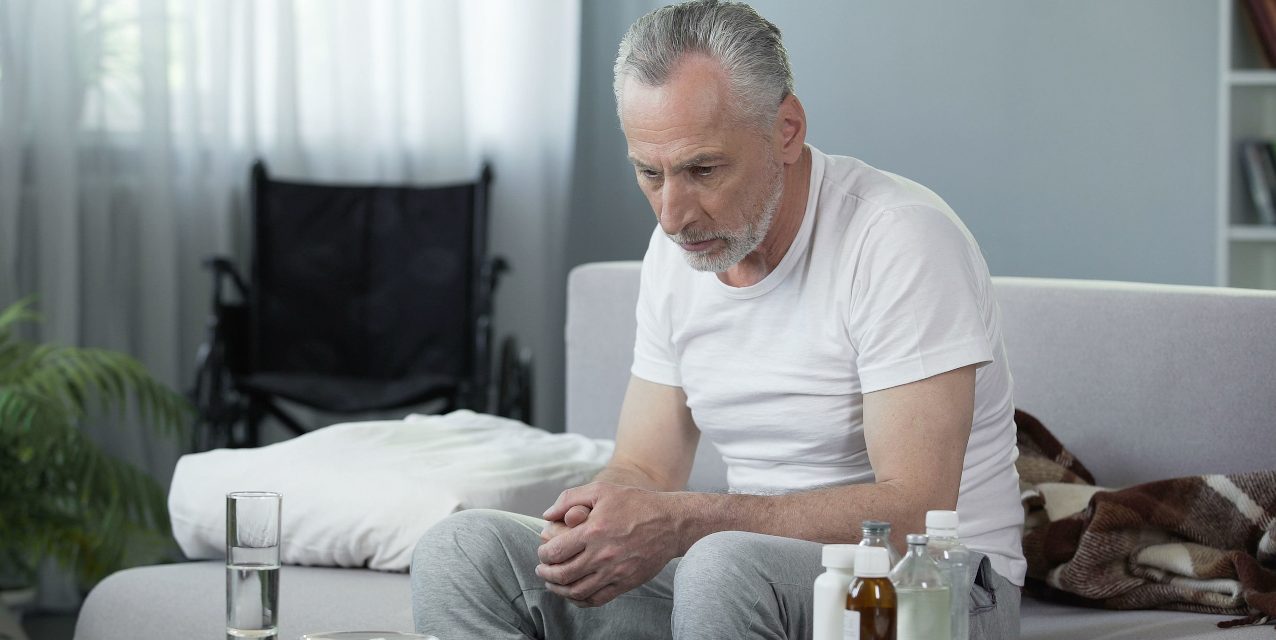By Mary Eileen Finch
He sits alone, slumped and bland, on the couch by the elevator every morning after breakfast, waiting for the line to dissipate. He only comes to meals – never an activity. (A range of emotional expression is clearly diminished, poor eye contact, reduced body language; https://psychcentral.com/schizophrenia/schizophrenia-symptoms/).
I drink an avocado-spinach smoothie every morning, running into my office in-between setting up for exercise to take sips.
His eyes track my movements as I drag a stack of chairs into the atrium, race back to my office for a sip of green goodness and then back to the activity room for another stack of chairs. (The eyes repeatedly fall back and then catch up with jerky movements, known as saccadic; http://www.schizophrenia.com/newsletter/397/397eyestudy.html).
I always say “hi” to him in passing. Sometimes he nods; (a lack of facial movement, facial expression, eye contact, and vocal inflection).
One day, I was hungrier than normal. I was trying to drink my smoothie and set up the chairs at the same time. This really wasn’t working well.
I plopped down next to him, sipped on my smoothie and started to chat. It was a one-sided conversation. Sometimes he’d nod; (may not speak much, even if they are in a situation where they are forced to interact).
Afterward, another resident pulled me aside and sternly stated, “You don’t want to sit by him. I heard he’s a schizophrenic. He could hurt you.”
I took a deep breath. I told myself to stay calm. I jotted down a note to bring in a mental health professional for a Holiday Retirement “Let’s Talk Seniors” and to show A Beautiful Mind during a movie matinée; (most people with schizophrenia suffer from symptoms either continuously or intermittently throughout life and are often severely stigmatized by people who do not understand the disease. https://www.bbrfoundation.org/what-is-schizophrenia-signs-symptoms-treatments).
I stopped rushing to my office for sips of my smoothie. I made a point to sit down on the couch for a couple of minutes as often as I could. In time, he started responding to my chatter with “ok”; (a diminished ability to begin and sustain conversation, poverty of speech, and brief, empty replies. https://www.sciencedirect.com/topics/medicine-and-dentistry/thought-disorder).
I’d start, “It was foggy on my drive to work today.”
“Ok”, he’d reply.
“I’m having tacos for supper tonight.”
“Ok.”
“I ran my first 5k!”
“Ok.”
I’d ask him if he’d like to join us for exercise. He’d slowly shake his head: (may no longer care about anything or become apathetic, characterized by a “lack of emotion”, interest, and concern. May become indifferent to important aspects of life. This leads to neglect of social, emotional, physical, and cognitive aspects of life. There is a lack in overall sense of purpose and the person may appear very sluggish. This is also very common among individuals with dementia. https://mentalhealthdaily.com/2014/04/01/negative-symptoms-of-schizophrenia/).
Six months of “ok” before he said, “I’m going to McDonald’s today”; (may have an inability to initiate work towards goal-oriented activities).
I was so shocked that I didn’t know what to say. So, I replied, “Ok.”
He nodded.
I nodded.
Then I proceeded to ask a million questions. Where? How long? What are you going to eat?
He answered each question, never elaborating; (if you discuss a certain topic, they may not know how to adequately carry on a conversation that relates to what you were talking about).
We fell into a routine. If I asked him something, he’d give a short answer. If I made a statement, he’d reply “ok”. I learned about his family, his career and his hobby — people watching.
As soon as the elevator was free, he’d get up and go.
Until one day, he stayed. He did exercises on the couch!; (motivation to engage in life’s activities may be blunted; https://www.bbrfoundation.org/faq/frequently-asked-questions-about-schizophrenia).
I was so proud of him! I told him, “I’m so excited you did that with us!”
“Ok.”
I was really, really sick recently and had to miss a few days of work.
He must have seen me drive in my first day back because he met me at the front door. “Good to have you back, Mary. We really missed you. Are you OK?”
My eyes watered. That was the first time he’d ever asked me a question; (unable to create any sort of emotional bond or connection with another person. May not have any friends and completely withdraw from society).
He now joins us for exercise every morning, attends Jumbo Crosswords and participates in all our trivia activities. He has a high IQ and is well educated. He mouths each answer to himself, only speaking it out loud if none of the other residents know the answers. I still sit with him on the couch as often as I can, it doesn’t matter if I have a smoothie or not. He’s started to really open up about his mental health and how it’s affected him his whole life, the progress he’s making at the VA hospital’s group sessions, and how his appointments with his social worker go.
For a Thanksgiving activity, I passed out fall leaf cutouts and asked the residents to write what they were most thankful for. Then they attached them to a ribbon on our grand staircase.
His leaf read, “I’m thankful for Mary. She helps me the most.”
Fight the stigma.







